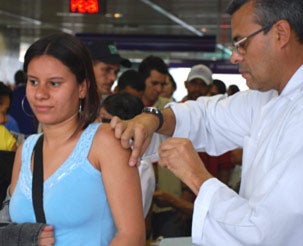Fund has helped make the Americas a leader in eliminating preventable diseases
Washington, June 26, 2008 (PAHO) - A revolving fund that helps countries buy large quantities of quality vaccines at low cost has been so successful in the Americas that regions of Africa and the Eastern Mediterranean are exploring similar mechanisms to guarantee access to vaccines and support their national immunization programs, Pan American Health Organization (PAHO) officials said.

Photo Paulo Leite (PAHO/WHO)
The PAHO Revolving Fund for Vaccine Procurement has operated for more than 30 years as a cooperation mechanism for the countries of Latin America and the Caribbean, helping them forecast their vaccine needs, negotiating low prices with vaccine manufacturers, establishing contracts on the countries' behalf, and providing lines of credit for purchases.
The fund is a critical component of regional immunization efforts that, according to Dr. Cuauhtemoc Ruiz, have "enabled the Region of the Americas to be the first region to be declared polio-free, the first to eliminate indigenous measles, and the region that has made the greatest strides in the elimination of rubella and congenital rubella syndrome (CRS)," as well as control of whooping cough, diphtheria, and neonatal tetanus.
In a briefing to PAHO's Executive Committee this week, Ruiz, senior advisor on Comprehensive Family Immunization, said the Revolving Fund "has been vital to maintaining high coverage by vaccination services and consequently to achieving equity with respect to immunological protection for the population of Latin America and the Caribbean."
In Latin America and the Caribbean, immunization prevents an estimated 174,000 deaths annually in children under 5. Ruiz said that universal use of new vaccines, specifically the rotavirus and pneumococcal conjugate vaccines, could prevent several thousand additional cases of illness and deaths.
Members of the PAHO Executive Committee meeting in Washington this week expressed support for the Revolving Fund, noting that its benefits have extended to developing countries in other regions by making it easier for them to negotiate lower prices for vaccines. In 2008, PAHO member countries bought 270.3 million doses of vaccine through the fund at a total cost of $271.7 million. Projected vaccine procurement for 2009 is about $369.5 million, Ruiz said.
The fund has allowed better forecasting for vaccine demand and boosted the pharmaceutical industry's confidence in vaccine markets of the developing world by facilitating economies of scale and better prices. "There is no doubt that the higher demand has been critical to expanding regional production capacity, which in turn has been a key factor in the success of the fund," Ruiz said.
PAHO and World Health Organization (WHO) immunization experts are discussing the establishment of similar revolving funds with health officials in the WHO regions of Africa and the Eastern Mediterranean, he said.
In the Americas, new and underutilized vaccines such as measles, mumps, and rubella (MMR); yellow fever; hepatitis B (HepB); Haemophilus influenzae type b (Hib); seasonal influenza; rotavirus; and pneumococcus vaccines have been incorporated into country programs quickly through the fund, Ruiz said. Since 2006, 16 countries have introduced the rotavirus vaccine, and 14 have introduced the heptavalent pneumococcal conjugate vaccine, saving lives.
PAHO, founded in 1902, works with all the countries of the Americas to improve the health and quality of life of their peoples. It also serves as the Regional Office for the Americas of WHO.
More about the Fund
The PAHO Revolving Fund for Vaccine Procurement is a cooperation mechanism established in 1979 for the purchase of vaccines, syringes/needles, and cold chain equipment for countries in Latin America and the Caribbean. The fund's objectives are to: 1) provide countries with a continuous supply of vaccines that meet PAHO/WHO standards at affordable prices; 2) enable countries to procure the required supplies of vaccines and syringes for immunization activities, thereby preventing interruptions due to lack of vaccines or immediate funds; 3) facilitate the use of local currency for the reimbursement of invoices; 4) consolidate vaccine and syringe contracts for volume purchasing, which results in more advantageous prices and improved delivery; 5) assure quality of vaccines being used in national immunization programs; and 6) establish procedures with suppliers to permit urgent orders to be placed and delivered on short notice.



